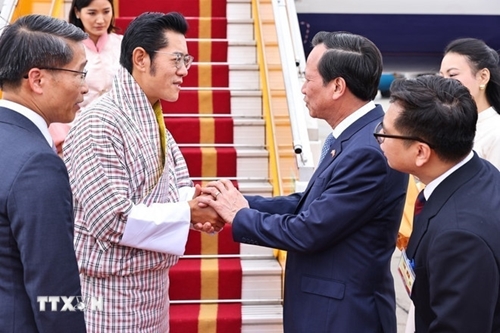This is the first official visit by the King and Queen of Bhutan since the establishment of diplomatic relations between the two countries. The visit carries historic significance, demonstrating Bhutan’s treasuring of its friendship and cooperation with Vietnam, and Vietnam’s growing role and position in the region.
Bhutan, a South Asian country located in the Himalayas, borders China to the North and India to the South, East, and West. As the “happiest nation in the world,” Bhutan does not measure economic development by the conventional Gross Domestic Product (GDP), but by the Gross National Happiness (GNH) index. Its long-term development strategy is to develop economy coupled with cultural preservation, environmental protection and the happiness of its people.
    |
 |
|
The King and Queen of Bhutan welcomed at Noi Bai International Airport |
Vietnam and Bhutan share many similarities and common values, especially Buddhist culture and a deep love of peace. Both countries pursue balanced and sustainable development goals. In 2012, Vietnam and Bhutan officially established diplomatic relations, marking a milestone in their bilateral ties. Since then, the friendship and cooperation between the two nations have grown positively. Leaders of the two countries frequently exchange letters and messages on important national occasions. The two nations have also coordinated closely and shown mutual support at international forums, particularly at the United Nations.
Prior to the King’s visit, Queen Mother Gyalyum Dorji Wangmo Wangchuck visited Vietnam in 2022, coinciding with the 10th anniversary of the diplomatic relations.
In terms of economic, trade, investment cooperation, Vietnam and Bhutan are working to promote two-way trade. Vietnam currently has two investment projects in Bhutan with a total registered capital of USD 937,000, which have been highly appreciated by Bhutan. Although bilateral trade remains modest, approximately USD 20,000 per year, mainly from Vietnam’s exports to Bhutan, there is considerable potential for growth.
Tourism cooperation is a highlight of bilateral relations. The launch of direct flights between Vietnam and Bhutan would provide a major boost for tourism ties. Both sides are considering establishing a consultation mechanism between their foreign ministries and signing several agreements to lay the foundation for cooperation, such as an air services agreement and a memorandum of understanding between the two civil aviation agencies.
The two countries are enhancing cooperation in religion, especially Buddhism, education, and human resource exchanges. Bhutan attaches importance to cooperating with Vietnam in academic and cultural exchanges and in promotion of people-to-people exchange at regional and international forums.
There remains huge potential to expand partnership between the two countries, especially as Bhutan shifts from a closed-door policy to a more open approach to attract external resources. This state visit by the King and Queen of Bhutan provides an opportunity for the two sides to review bilateral relations comprehensively and outline new directions for cooperation suitable for their development conditions in the coming time. The visit also opens a chance for Vietnam to reaffirm its consistent foreign policy, set forth at the 13th National Party Congress, of independence, self-reliance, peace, cooperation, development, diversification, and multilateralization of external relations while deepening bilateral ties with partners, especially South Asian countries, including Bhutan.
On the foundation of the strong friendship, the visit is strongly believed to mark an important step forward, opening a new stage of cooperation and further strengthening Vietnam - Bhutan relations in a more substantive and effective manner, for the benefit of people of both countries, and contributing to peace, stability, and prosperity in the region and the world.
By Editorial Board
Translated by Mai Huong